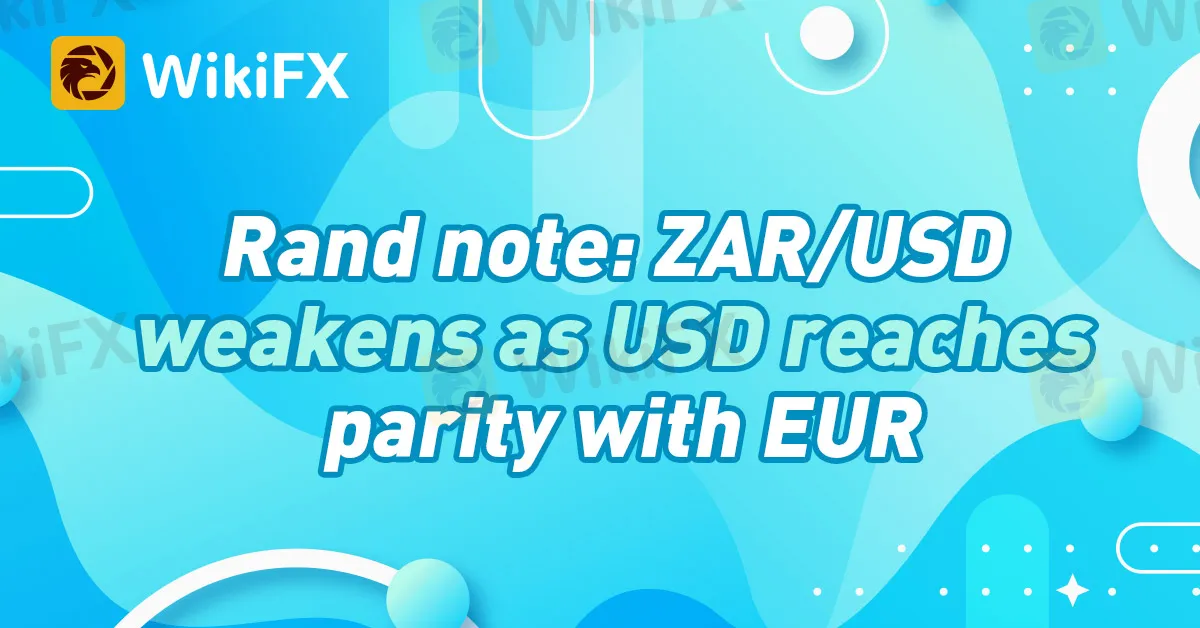简体中文
繁體中文
English
Pусский
日本語
ภาษาไทย
Tiếng Việt
Bahasa Indonesia
Español
हिन्दी
Filippiiniläinen
Français
Deutsch
Português
Türkçe
한국어
العربية
Rand note: ZAR/USD weakens as USD reaches parity with EUR
Abstract:The rand is now trading at 17.03/USD (up from R16.97/USD on Friday), and due to the US dollar's strength, it is now almost at parity with the euro at R17.17/EUR. The local currency is not being helped by negative perceptions of both internal and foreign events.

The rand is now trading at 17.03/USD (up from R16.97/USD on Friday), and due to the US dollar's strength, it is now almost at parity with the euro at R17.17/EUR. The local currency is not being helped by negative perceptions of both internal and foreign events.
With net flows of -R0.1bn, foreigners continue to be net sellers of SA government bonds this quarter. Last week, R4.3 billion was sold in only two days, compared to R3.6 billion throughout the course of Q2.22.
The rand often performs poorly in the second and third quarters of the year because senior traders in risk assets, such as EM currencies and portfolio instruments, frequently take summer vacations.
Fears of excessive interest rate rises, which might send nations into recession, are gradually taking the place of market worries over rising inflation, and risk sentiment on international financial markets is fragile and markedly risk adverse.
The revelation on Friday of stronger than anticipated US jobs numbers and a stable 3.6 percent unemployment rate has increased market concerns about more sharp US rate rises throughout H2.22—an additional 175bp increase, according to FOMC member projections.
The markets are generally in line with the FOMC statement since they anticipate an 185bp increase. Market participants are concerned that the rate increases, which will push the fed funds rate well over its neutral level, could stifle economic expansion.
Significant load shedding has harmed SA's domestic growth prospects, which might have a detrimental effect on state tax collections. The severe stage 4 and stage 6 power outages have reduced company productivity, and the intense pressure that unions have placed on Eskom, the state-owned electrical utility, is seen negatively from both a political and an economic one. The 2024 ANC electoral conference has increased political commotion in South Africa generally, which is likely to worry investors even more. The state capture faction of the ANC (commonly known as the RET) is using every chance to damage the reputation of the present president.

Disclaimer:
The views in this article only represent the author's personal views, and do not constitute investment advice on this platform. This platform does not guarantee the accuracy, completeness and timeliness of the information in the article, and will not be liable for any loss caused by the use of or reliance on the information in the article.
Read more

Thinking of Investing? Read Must-Know Facts About Funding pips!
When you check the internet for Funding Pips, you'd be surprised to know it's filled with praise for Funding Pips but often lacks the real facts that traders need. Everything that seems too good to be true should always be verified first. It could be Fraud . So, we conducted research and collected several facts you must know about Funding Pips.

OctaFX Back in News: ED Attaches Assets Worth INR 134 Cr in Forex Scam Case
The Enforcement Directorate (ED) in Mumbai has attached assets worth around INR 131.45 crore. This included a luxury yacht and residential properties in Spain. Read this interesting story.

Truth About Angel One – Here’s What You Need to Know
Thinking about investing in Angel One? Wait! Know the essential things about the broker before Invest. It could be SCAM. Read, think, and invest .

FIBO Group MT5 Cent Account with Ultra-Leverage up to 1:5000 for Beginners
FIBO Group's MT5 Cent account offers a low-deposit Forex trading account with ultra-high leverage up to 1:500 for testing strategies on MetaTrader 5.
WikiFX Broker
Latest News
He Thought He Earned RM4 Million, But It Was All a Scam
CryptoCurrency Regulations in India 2025 – Key Things You Should Know
OctaFX Back in News: ED Attaches Assets Worth INR 134 Cr in Forex Scam Case
Trump inaugural impersonators scammed donors out of crypto, feds say
Ethereum is powering Wall Street's future. The crypto scene at Cannes shows how far it's come
Forex Hedging: Is It a Trader’s Safety Net or Just an Illusion?
US debt is now $37trn – should we be worried?
OPEC+ members agree larger-than-expected oil production hike in August
Dukascopy Ends EOS/USD Trading Amid Liquidity Issues
FIBO Group MT5 Cent Account with Ultra-Leverage up to 1:5000 for Beginners
Currency Calculator


